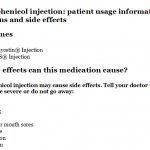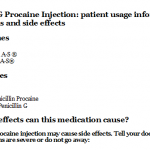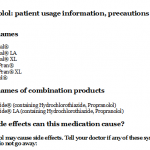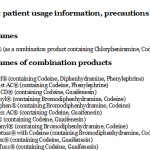
Choline Magnesium Trisalicylate: patient usage information, precautions and side effects
Tuesday, May 30, 2017 by Gregory Van Dyke
http://www.naturalnewsreference.com/2017-05-30-choline-magnesium-trisalicylate-patient-usage-information-precautions-and-side-effects.html
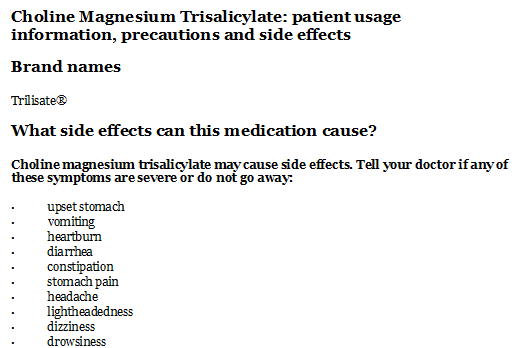
Choline Magnesium Trisalicylate: patient usage information, precautions and side effects
Brand names
Trilisate®
What side effects can this medication cause?
Choline magnesium trisalicylate may cause side effects. Tell your doctor if any of these symptoms are severe or do not go away:
-
upset stomach
-
vomiting
-
heartburn
-
diarrhea
-
constipation
-
stomach pain
-
headache
-
lightheadedness
-
dizziness
-
drowsiness
-
lack of energy
Some side effects can be serious. The following symptoms are uncommon, but if you experience any of them, call your doctor immediately:
-
ringing in the ears
-
hearing loss
-
black and tarry stools
-
red blood in stools
-
bloody vomit
-
vomiting material that looks like coffee grounds
Choline magnesium trisalicylate may cause other side effects. Call your doctor if you have any unusual problems while taking this medication.
If you experience a serious side effect, you or your doctor may send a report to the Food and Drug Administration’s (FDA) MedWatch Adverse Event Reporting program online (http://www.fda.gov/Safety/MedWatch) or by phone (1-800-332-1088).
Why is this medication prescribed?
Choline magnesium trisalicylate is used to relieve the pain, tenderness, inflammation (swelling), and stiffness caused by arthritis and painful shoulder. It is also used to relieve pain and lower fever. Choline magnesium trisalicylate is in a class of nonsteroidal anti-inflammatory medications (NSAIDs) called salicylates. It works by stopping the body’s production of a substance that causes pain, fever, and inflammation.
How should this medicine be used?
Choline magnesium trisalicylate comes as a tablet and a liquid to take by mouth. It is usually taken one to three times a day. To help you remember to take choline magnesium trisalicylate, take it around the same time every day. Follow the directions on your prescription label carefully, and ask your doctor or pharmacist to explain any part you do not understand. Take choline magnesium trisalicylate exactly as directed. Do not take more or less of it or take it more often than prescribed by your doctor.
Other uses for this medicine
This medication may be prescribed for other uses; ask your doctor or pharmacist for more information.
What special precautions should I follow?
Before taking choline magnesium trisalicylate,
-
tell your doctor and pharmacist if you are allergic to choline magnesium trisalicylate, aspirin, choline salicylate (Arthropan), diflunisal (Dolobid), magnesium salicylate (Doan’s, others), salsalate (Argesic, Disalcid, Salgesic), or any other medications.
-
tell your doctor and pharmacist what prescription and nonprescription medications, vitamins, nutritional supplements, and herbal products you are taking. Be sure to mention any of the following: acetazolamide (Diamox); antacids; anticoagulants (‘blood thinners’) such as warfarin (Coumadin); dichlorphenamide (Daranide); insulin and oral medications for diabetes such as acetohexamide (Dymelor), chlorpropamide (Diabinese), glimepiride (Amaryl), glipizide (Glucotrol), glyburide (DiaBeta, Glynase, Micronase), tolazamide (Tolinase), and tolbutamide (Orinase); medications for gout such as probenecid (Benemid) and sulfinpyrazone (Anturane); methazolamide (GlaucTabs, Neptazane); methotrexate (Rheumatrex); oral steroids such as dexamethasone (Decadron, Dexone), methylprednisolone (Medrol), and prednisone (Deltasone); other salicylate pain relievers such as aspirin, choline salicylate (Arthropan), diflunisal (Dolobid), magnesium salicylate (Doan’s, others), and salsalate (Argesic, Disalcid, Salgesic); phenytoin (Dilantin); and valproic acid (Depakene, Depakote). Your doctor may need to change the doses of your medications or monitor you carefully for side effects.
-
tell your doctor if you have or have ever had stomach problems such as ulcers or kidney or liver disease.
-
you should know that choline magnesium trisalicylate should not be taken by children and teenagers with chicken pox or the flu, because of the risk of Reye Syndrome, a rare but serious disease.
-
tell your doctor if you are pregnant, plan to become pregnant, or are breast-feeding. If you become pregnant while taking choline magnesium trisalicylate, call your doctor.
-
if you are having surgery, including dental surgery, tell the doctor or dentist that you are taking choline magnesium trisalicylate.
-
ask your doctor about the safe use of alcoholic beverages while you are taking choline magnesium trisalicylate. Alcohol can make the side effects from choline magnesium trisalicylate worse.
What special dietary instructions should I follow?
Unless your doctor tells you otherwise, continue your normal diet.
What should I do if I forget a dose?
Take the missed dose as soon as you remember it. However, if it is almost time for the next dose, skip the missed dose and continue your regular dosing schedule. Do not take a double dose to make up for a missed one.
Why is this medication prescribed?
How should this medicine be used?
What special precautions should I follow?
What special dietary instructions should I follow?
What should I do if I forget a dose?
What side effects can this medication cause?
What should I know about storage and disposal of this medication?
Tagged Under: Tags: chemical medicine, medication, Pharma, Prescription Medicine

